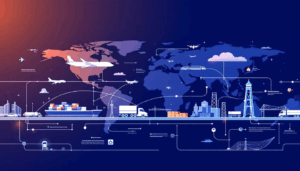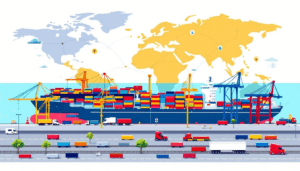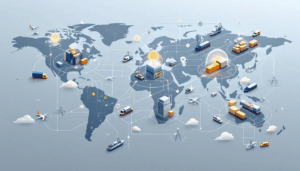International logistics involves moving goods across borders efficiently. It’s crucial for businesses seeking global expansion and optimized supply chains. This article covers strategies, key players, the flow of goods, technological advancements, and common challenges in international logistics.
Key Takeaways
- International logistics involves the efficient coordination of goods movement across borders, crucial for optimizing supply chain operations and enhancing competitiveness.
- Key players, including shippers, carriers, freight forwarders, and customs brokers, work collaboratively to ensure compliance and streamline the logistics process.
- Emerging technologies, such as AI and automation, improve operational efficiency and tracking capabilities, while addressing significant challenges like regulatory compliance and risk management.
Understanding International Logistics

International logistics is the art of coordinating and managing the movement of goods across borders to ensure efficient and cost-effective delivery to global consumers. It plays a crucial role in enabling international trade, maintaining distribution networks, and ensuring timely and safe transportation of goods. The process involves the shipping and fulfillment of finished goods globally, requiring careful design and optimization of routes to achieve service efficiency. Successful international logistics also requires taking account of specific handling and transportation instructions to prevent damage and ensure compliance.
The two main functions within logistics are transportation and warehousing. Ensuring timely arrival of merchandise significantly improves supply chain efficiency and reduces waste of time and materials.
In today’s competitive marketplace, effective logistics is not just an operational necessity but a strategic advantage that can drive business growth and customer satisfaction.
Key Players in International Logistics
The world of international logistics is a complex network of key stakeholders, each playing a vital role in the seamless movement of goods. Shippers are responsible for preparing and sending goods, ensuring they meet all regulations and standards. Carriers, on the other hand, handle the actual transportation of goods across international borders, making sure that shipments reach their destinations.
The roles involved in international logistics and trade compliance include:
- Freight forwarders: Coordinate shipments on behalf of shippers, managing logistics and documentation.
- Customs brokers: Facilitate the clearance of goods through customs, ensuring compliance with international regulations.
- Regulatory bodies: Oversee international trade compliance and safety standards, ensuring that all logistics activities adhere to the necessary guidelines. Certain categories of goods are subject to specific trade policies and customs regulations, which these bodies enforce.
Together, these players form a cohesive unit that drives the efficiency and reliability of international logistics.
The Flow of Goods in the International Supply Chain
The flow of goods in the international supply chain is a well-orchestrated process that involves the systematic movement of goods, money, and information across borders. This flow includes:
- Upstream movement for raw materials
- Downstream movement for finished products
- Financial flow involving the transfer of funds from customers to suppliers, ensuring timely procurement of inventory.
Information flow is equally critical, occurring in multiple directions and involving real-time updates between suppliers, sellers, and customers. Data analytics plays a pivotal role in optimizing routes and inventory management, leading to better logistics planning and more relevant information for informed decisions.
Efficient management of reverse flow is also essential for handling returns and minimizing losses from unsold inventory.
Importance of International Logistics for Global Trade
Participating in international logistics significantly contributes to a country’s economic growth by improving productivity and enabling smoother trade operations. Timely deliveries are crucial for maintaining customer satisfaction and loyalty, which are key to sustaining business relationships in the global market.
International logistics supports global trade by ensuring the smooth transit of goods and services across borders, ultimately facilitating economic development and international transport. Optimizing logistics processes can help lower prices for consumers and increase profitability for businesses by reducing overall costs and improving efficiency.
Essential Components of International Logistics
International logistics faces several challenges that can impact efficiency and effectiveness. Successful management depends on timely and accurate documentation for customs compliance and overcoming obstacles such as:
- Skilled labor shortages affecting logistics operations
- Navigating changes in tariffs and international trade regulations
- Limited access to comprehensive insurance options
Regulatory Compliance
Adhering to complex international regulations and tariffs is crucial for smooth international logistics operations. Strict compliance with customs procedures helps avoid costly delays and penalties, ensuring shipments move efficiently across borders. Maintaining up-to-date knowledge of regulatory requirements is essential for managing freight shipments effectively.
Risk Management
Effective risk management is vital to address challenges such as geopolitical instability, natural disasters, and supply chain disruptions. These factors can significantly affect logistics routes, requiring businesses to implement robust strategies to mitigate risks and maintain continuity in international transport.
Handling Hazardous Materials
Transporting hazardous materials demands strict adherence to international safety regulations to ensure safety and minimize legal liabilities. Non-compliance can lead to severe penalties and environmental harm. Proper management of hazardous materials is a critical component of responsible international logistics and trade operations.
Optimizing International Logistics for Business Growth
Efficient international logistics provides businesses with increased market opportunities, enhanced operational efficiency, cost reduction, and higher profitability. Demand planning ensures customer order fulfillment and safeguards profits, while selecting optimal transportation modes based on cost, speed, and reliability is essential for logistics optimization.
Utilizing online freight quote tools facilitates efficient and affordable movement of full truckload and less than truckload (LTL) freight services, streamlining the shipping process.
Partnering with Multiple Carriers
Collaborating with multiple carriers allows businesses to access competitive rate quotes for freight, significantly lowering transportation costs. Online quoting platforms simplify the comparison of LTL freight rates, enabling companies to identify the most economical and reliable carrier options.
Coordinating shipments across various carriers helps maximize shipment volumes, secure the lowest tariffs, and avoid unnecessary absolute minimum charge fees, optimizing shipping costs and enhancing customer satisfaction.
Efficient Packaging Solutions
Effective packaging solutions minimize product damage and optimize space utilization during shipping, safeguarding goods throughout transit. Proper packaging reduces costs associated with empty space and damaged items, contributing to improved customer satisfaction.
Investing in high-quality packaging enhances the overall shipping experience and supports efficient handling units within the supply chain.
Leveraging Data Analytics
Visibility of goods within international logistics enables better planning and contingency management for potential delays. Successful logistics operations rely on precise, relevant information, accurate demand forecasting, and efficient inventory management.
The growing logistics automation market highlights the increasing integration of robotics and data analytics in supply chain operations. Robotic solutions can improve logistics efficiency by up to 48%, making data-driven decision-making a critical factor in optimizing international logistics.
Summary
International logistics is a complex yet essential element of global trade, requiring seamless coordination among key stakeholders and efficient management of goods, financial flows, and information. By embracing advanced technologies and optimizing supply chain operations, businesses can expand their market reach, reduce shipping costs, and enhance overall efficiency.
Adopting strategic international logistics practices not only supports economic growth but also ensures high customer satisfaction and competitive advantage. Mastery of these strategies is indispensable for success in the dynamic global marketplace.
Frequently Asked Questions
What are the key components of international logistics?
The key components of international logistics include diverse transportation modes, warehousing and storage, and customs procedures. Together, these elements facilitate the smooth movement and delivery of goods across borders, ensuring efficient global trade operations.
How do advanced technologies enhance international logistics?
Advanced technologies such as AI, IoT, and blockchain enhance international logistics by improving operational efficiency, increasing visibility, and enabling precise tracking. These technologies promote transparency and streamline logistics activities, leading to better decision-making and optimized freight shipping.
What are the main challenges faced in international logistics?
Primary challenges in international logistics encompass regulatory compliance, risk management related to geopolitical instability and natural disasters, and the safe handling of hazardous materials under international regulations. Addressing these challenges is vital for maintaining efficient and secure logistics operations.
How can businesses optimize their international logistics operations?
Businesses can optimize international logistics by partnering with multiple carriers for competitive rates, investing in efficient packaging solutions, and leveraging data analytics for accurate demand forecasting and inventory management. These strategies improve cost efficiency and streamline freight shipments.
Why is warehousing important in international logistics?
Warehousing is critical in international logistics as it enables effective inventory management, ensures timely product availability, and supports prompt shipping to customers. Efficient warehousing directly contributes to enhanced supply chain performance and customer satisfaction.





Leave A Comment
You must be logged in to post a comment.